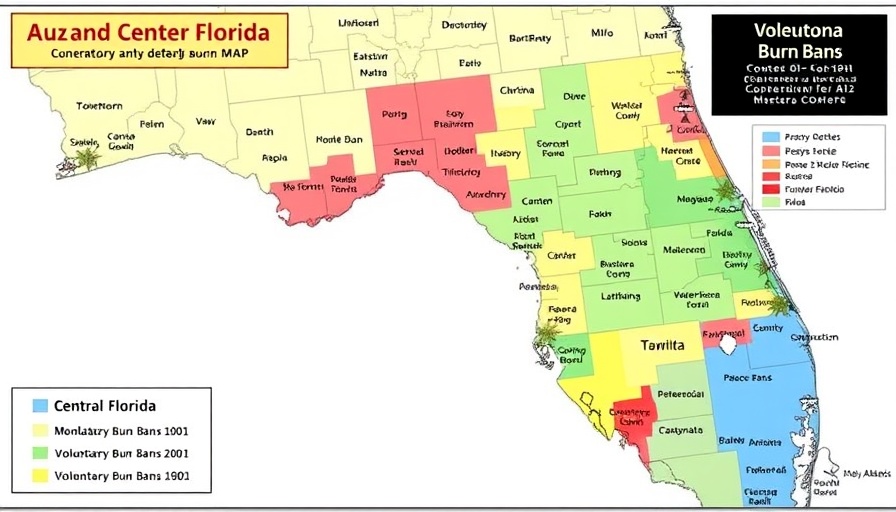
The Escalating Risk of Wildfires in Central Florida
As Central Florida faces escalating drought conditions alongside dry, gusty winds, the risk of wildfires has soared. County officials across the region have responded by implementing burn bans, aiming to safeguard residents and prevent catastrophic fires that could devastate homes and natural landscapes. Understanding the current circumstances sheds light on why these measures are essential for safety.
What Exactly Is a Burn Ban?
A burn ban is a regulatory measure enacted by local authorities when prolonged dry weather conditions increase the risk of fire. During a burn ban, activities such as campfires, bonfires, and outdoor burning of any kind are prohibited. Essentially, it is a preemptive action designed to minimize fire-related hazards. Such prohibitions are critical in mitigating incidents of wildfires, which can escalate rapidly in dry weather.
Current Burn Bans Across Central Florida
The following counties in Central Florida have instituted burn bans recently due to severe dry conditions:
- Seminole County: Implemented since April 17
- Orange County: In effect since April 16
- Polk County: Active from April 15
- Volusia County: Enforced since April 16
- Lake County: Started on March 25
- Flagler County: In effect since April 16
- Sumter County: Active since April 14
- Brevard County: Started on April 22
This patchwork of burn bans highlights the widespread impact of drought across the region and the concerted efforts of local governments to prioritize safety.
Understanding Drought Conditions
The potential for wildfires often correlates with the region's climatological status. Areas experiencing lower-than-average rainfall coupled with high temperatures and winds create an environment ripe for fire outbreaks. According to weather forecasts, Central Florida may continue to face drought-like conditions, emphasizing the importance of ongoing vigilance and adherence to burn bans.
The Societal Impact of Burn Bans
While burn bans may disrupt outdoor activities and festive gatherings, such as campfires and local celebrations, they play a critical role in community safety. These measures remind residents of the shared responsibility toward fire prevention. Public awareness campaigns often accompany burn bans, educating residents on the risks and encouraging compliance.
Looking Ahead: Predictions for the Fire Season
Weather experts predict that if current trends continue, wildfire risks will remain elevated in the coming months. These predictions urge people to be proactive about fire safety, seeking alternative ways to enjoy outdoor spaces such as hosting fire-free picnics and utilizing designated grilling areas.
Community Strategies for Fire Safety
Here are actionable steps each homeowner can take to reduce fire hazards:
- Maintain Landscapes: Regularly trim dry grass and remove dead leaves from yards.
- Store Materials Safely: Keep firewood and other flammable materials away from home structures.
- Awareness and Compliance: Stay informed about local burn bans and educate neighbors about fire risks.
These simple preventative measures can make a significant difference in protecting properties and lives.
Conclusion: Safety First
In light of the increasing frequency of burn bans across Central Florida, it’s crucial for residents to become proactive about fire safety. By respecting burn regulations and taking personal safety measures, communities can significantly mitigate the risk of wildfire damage. As we navigate these dry conditions, staying informed and cautious will help in preserving both our homes and our beautiful landscapes.
 Add Row
Add Row  Add
Add 




Write A Comment